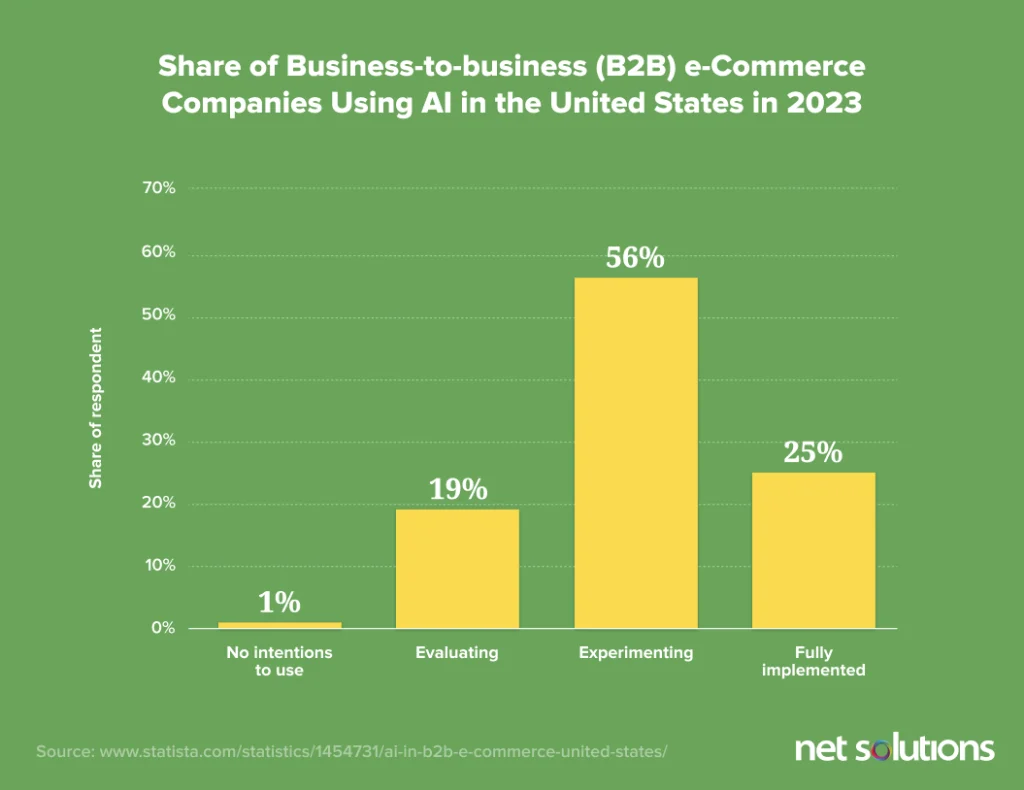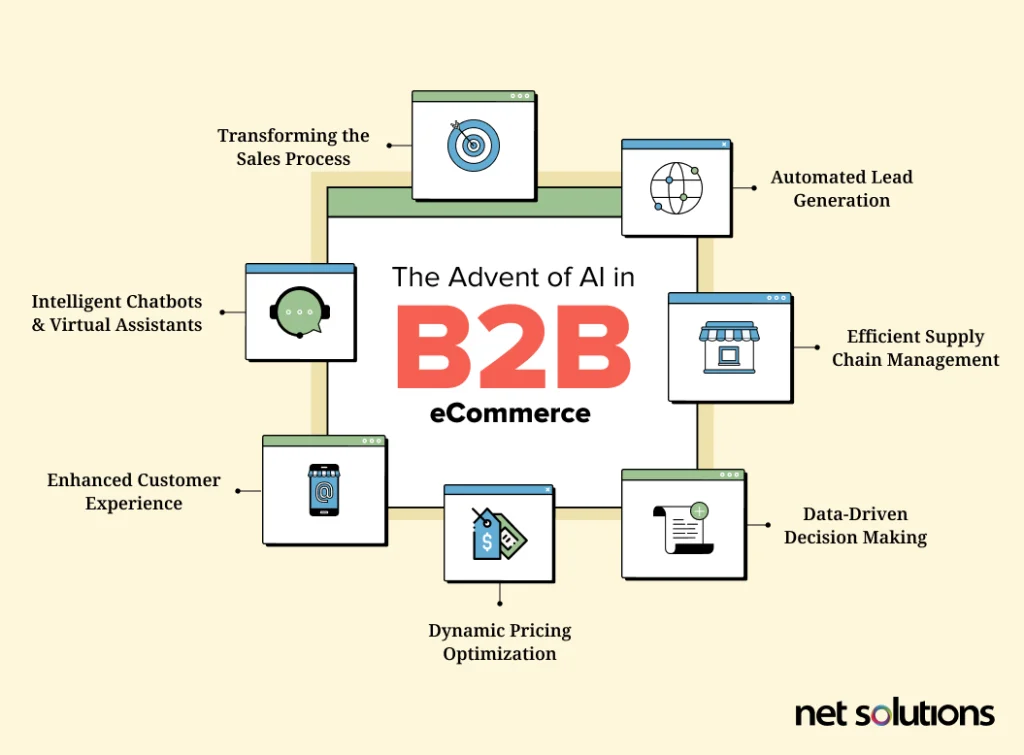With the rapid growth of business-to-business or B2B eCommerce and the influence of consumer expectations on the B2B buying experience, there has been a huge growth in the use of artificial intelligence (AI). Today, AI is not just a “cool” feature, it’s opening up transformative opportunities for B2B eCommerce developers, marketers, business owners and also B2B buyers.
In this guide, we will provide a comprehensive guide on the role of AI in B2B eCommerce, including how AI is amplifying the benefits of B2B eCommerce and addressing common B2B challenges. We’ll also introduce the B2B eCommerce platforms using AI as well as some third-party applications you can leverage to get started.
What is AI in B2B eCommerce?
AI is technology that enables the use of computers to simulate human intelligence to perform tasks, solve problems, and interact with the environment, even creatively. AI models can analyze huge volumes of data to pull forth insights in a fraction of the time of human minds, revolutionizing every area of B2B eCommerce.
AI can encompass several other terms:
- Data mining – gathering intelligence from large volumes of data
- Machine learning – the ability of a machine to learn from data, make predictions or decisions, and improve over time
- Natural language processing – the ability for a computer to recognize, interpret and generate text or speech, enabling generative AI (genAI)
AI is being used to understand B2B buyer behavior and improve the buyer experience, to optimize the supply chain, to streamline operations, to improve payments and security, and much more. AI is one of the top B2B eCommerce trends because it has become prolific in its capabilities and much more approachable, even for small B2B eCommerce businesses.
What’s the difference between AI in B2B vs. B2C eCommerce?
The growth in AI in eCommerce is occurring for both business-to-business (B2B) and business-to-commerce (B2C) businesses, with platforms integrating AI and third-party AI applications offering powerful solutions to stay ahead of the competition. In fact, AI-enabled eCommerce solutions are estimated to reach $16.8 billion by 2030.

The differences between B2B and B2C eCommerce business models, who they sell to, and the capabilities they need in an eCommerce platform to support the buying journeys are critical to understanding how AI can come into the picture to assist. If you want to know more about how AI can help in B2C specifically, we also have a guide to AI in Retail.
Let’s have a look at some of the critical differences between B2B and B2C eCommerce:
Catalog complexity
In general B2C eCommerce includes products that are produced in mass quantities to fit trends. Consumers often choose emotively after browsing, with one brand much the same as another, despite small differences. In B2B, products are designed to solve a particular business problem or need, with businesses being much more picky about which product exactly suits their needs. In some B2B situations, products may also be bought in bulk quantities from eCommerce sites with massive numbers of SKUs.
B2B and B2C will benefit from intelligence derived from purchasing and browsing behavior to surface product recommendations and prioritize search results. However, in B2B, AI can also tailor entire product catalogs to each buyer (individual, company, vertical, location, etc) or to assist buyers in purchasing products that may come from multiple sources, depending on availability and demand.
Decision-making processes
B2C purchases are often emotive and impulsive, particularly in the retail space. In this setting, AI tools that capture buyer browsing behavior can recommend products or trigger time-sensitive offers to encourage the sale.
In B2B, decision making often involves an average of 6-8 stakeholders, prolonging the initial buying cycle as deliberate decisions are made and professional reputations are on the line. AI tools here are geared toward providing information and data to accelerate decisioning.
Pricing and payment models
B2C prices are fixed and upfront, with the only variability coming from currency, shipping and tax between locales. AI tools can assist in fraud detection or predictive analysis to help forecast product demand. NLP tools in chatbots can help answering pricing and payment-related questions.
In B2B, differentiated pricing models are common, based on organization size, order quantity, frequency of purchase, tiers, vertical, or even dynamic inputs such as market demand or cost plus pricing. AI tools can help segment customers and offer appropriate pricing models, where prices are displayed up front. Additionally, intelligence tools can be used to streamline a more complex payment chain involving quotes, approvals, comments, invoicing and payment.
Focus of third-party app integration
In B2C eCommerce, the majority of AI tools that businesses use are focused on marketing and sales: on improving the user experience through personalization or on automating marketing tasks such as content creation, content summaries, search engine optimization (SEO), or image editing. Much of the intelligence derived from AI tools is used to assist in product development or marketing.
In B2B, the emphasis of AI is on improving back office capabilities: improving supply chain operations, inventory management, sales forecasting and dynamic pricing. Personalization is a growing area for B2B.
What Are the Benefits of AI in B2B eCommerce
There are a myriad of benefits associated with the use of AI in B2B eCommerce, both those features being natively integrated into B2B eCommerce platforms as well as third-party AI applications designed to support B2B sellers. Advancements in AI have brought the following benefits:

Improved customer experience
Buyer experience is everything; 90% of B2B buyers would switch to a competitor if they offered a better online customer experience. AI-powered tools that understand the B2B customer journey can help boost customer conversion, retention and loyalty including virtual chatbots and customer service assistance, advanced search (by image, barcode, product type), personalization in the web experience and more.
Enhanced decision-making
AI can tap into large volumes of data to draw intelligence out. This can include connecting multiple data stores (e.g. CRM, ERP, inventory management) into one place and combining that with on-site information (e.g. purchasing and browsing behavior across channels) to present insights on a dashboard and/or through reports. This automation of intelligence frees up time to quickly refine marketing and sales or inform new product or business ideas.
Automation of routine tasks
Workflow automation is a huge area of AI for B2B, using tools to eliminate manual effort and reduce the cost associated with that effort. Workflow automation tools include syncing pricing and product information across channels, marketplaces and systems (e.g. ERP), inventory management (matching stock to demand), as well as tools for marketing and sales such as sales automations, content development tools, following up on invoices, reporting and more. Choose tools that offload the most time-consuming repetitive tasks.
Personalized marketing and sales
AI can learn from purchasing and browsing behavior across channels to provide tailored product recommendations, determine the appropriate product catalog to display and offer value-added information to assist in the purchase (e.g. webinar invitation, product sheets) to ultimately support the customer journey and conversion rates. AI also provides a lot of leverage to account-based marketing, helping gain insight into how campaigns are working or which leads are most promising. Predictive analysis AI can find patterns, watch for trends, or unlock opportunities that otherwise would be missed from large volumes of data.
Supply chain optimization
B2B purchasing can involve more complex supply chains including logistics, production, marketing and sales, with AI being used to help with demand forecasting by product or locale, prioritizing suppliers based on a number of variables, managing production and transportation flows (automation) and more. Those using AI can see savings in logistics costs by 15%, inventory levels by 35% and service levels by 65%.
With these benefits in mind, let’s look at how you can tap into AI for your B2B business:
Which B2B eCommerce platforms have integrated AI?
B2B eCommerce platforms or eCommerce platform B2B editions are designed specifically to support the needs of B2B sellers. Many B2B eCommerce platforms are investing in AI, including:
- Adobe Commerce (Magento) includes native AI capabilities to deliver content and promotions, for merchandising, site search, and product recommendations
- Oracle B2B Commerce includes intelligence for product recommendations
- Salesforce B2B uses conversational AI to assist in workflows, leverage data for AI insights, support chat, deliver customized experiences, and streamline order management
- SAP Commerce Cloud (Hybris) uses AI to assist in decision making and provide personalized and adaptive search and merchandising
- OroCommerce uses AI for chatbots, product recommendations, workflow automation, data analysis and reports and guided selling experiences
- Shopware leverages AI tools to automate content generation (product descriptions, posts, personalized checkout messages, image keywords, review summaries, proofing), for conversational and image-based search, to transform text to image, create targeted marketing, streamline data export, SEO and more.
What Are the Key Applications of AI in B2B eCommerce
Here are some examples of how B2B eCommerce stores are using AI and a few third-party tools you can leverage for each of the use cases:
Chatbots and virtual assistants
B2B buyers expect speed in their customer interactions both pre-sale and post-sale, with B2C expectations for rapid response influencing this. In fact, the first seller to respond with a quote wins the deal 60% of the time. While a chatbot isn’t going to supply a full quote, it offers real-time 24/7 initial interaction that can boost customer satisfaction, including:
- Answering initial customer questions or directing buyers to appropriate resources or personalized recommendations
- Identify or quantify leads
- Assist with self-service ordering
- Provide post-purchase support
- Schedule sales calls
B2B chatbot services include Cognism, Tidio, Dashly, and B2B Rocket
Predictive analytics
With a long buying journey and multiple stakeholders, it can be difficult to manage all the variables that impact the buyer journey. Predictive analytics analyzes large volumes of data to make more informed decisions to help segment audiences, qualify leads, forecast sales, determine demand for products, inform campaigns, or identify other opportunities. 84% of marketing leaders already use predictive analytics.
Examples of options to support AI-driven data analysis include IBM Watson Studio, Pecan, Breadcrumbs or Aveva for critical infrastructure sectors.
Customer segmentation
Create automated segments to better tailor sales and marketing efforts across channels (email, text, web, ads, social), which can include helping define the marketing message and channel that is ideal for the segment, inform product improvements, test marketing and pricing differences, or help prioritize efforts toward the highest value opportunities.
Segmentation can be based on a number of factors, including:
- Location
- Industry
- Number of employees
- Purchasing or browsing behavior
Third-party options include DynamicYield, Bloomreach, Insider and Ninetailed.
Personalization
Personalization is becoming a key differentiator for B2B sales and marketing campaigns, helping boost time on site and conversion. AI personalization tools or recommendation engines uses segmentation information with customer behavior to support personalization efforts including product recommendations, product discovery, promotions, and omnichannel journey support.
The following third-parties assist in segmentation and personalization: DynamicYield, Bloomreach, Insider, Algolia and Ninetailed
Dynamic pricing
Differentiated pricing models are a hallmark of B2B eCommerce, from customer-specific to bulk pricing; however, dynamic pricing is an area where AI is very useful. In a dynamic pricing model, price can be tied to market demand, supply conditions, competitive prices, cost plus pricing, location, time of year or more. While dynamic pricing may seem very “retail,” it’s ideal in B2B, especially for industrial sectors that have high variability in raw materials. A note of caution: too much variability can erode trust, so have some human oversight for AI.
There are many different kinds of models to support dynamic pricing. Examples of dynamic pricing tools are PriceFX, Vendavo and Symson.
Inventory management
Inventory management is critical in any scenario, but added channels increases the chance that data will go out of sync. There is also a need to balance meeting capacity needs (e.g. for bulk orders) without the overhead of excess stock. Predictive analytics and other AI tools can be helpful with demand forecasting, cost optimization, tracking and more.
Tools for inventory management include Blue Ridge, Netstock, and Logility’s DemandAI+
Fraud detection
Supply chain management
AI can be used to optimize the supply chain, automating tasks related to documentation chain of custody, real-time shipment tracking, or optimizing drivers, vehicles, routes or ports. AI tools are helping provide more resiliency, transparency and efficiency over the supply chain, helping reduce prices and deliver on customer experience.
Tools include TradeBeyond and FourKites.
Search and navigation
AI-assisted search for large-volume SKU catalogs can help reduce the friction in the B2B buying experience. Based on each interaction a buyer (and past buyers) have with your brand, intelligent search can help personalize search with suggestions, relevant information (e.g. store location), multi-query search, or suggest text while typing.
Many of these capabilities can also be added with third-party software such as Algolia, Elastic, Klevu or Coveo.
AI has a great deal of potential, but also some things you should be aware of:
What Are the Challenges of AI in B2B eCommerce?
Implementing AI of any kind into B2B companies has implications across a wide variety of scenarios, including:
Data privacy and security concerns
There are a growing number of data privacy and security concerns associated with the storage and processing of customer data, including browsing behavior and historical data. There is a risk that could be intercepted or breached by a cyberattack, and other regulations in which consumers have the right to have their information deleted (e.g. GDPR, CCPA and other State or National regulations).
Be aware of the laws in the regions in which you reside and of the data you collect, provide transparency to users in your privacy policy, require an opt-in, and vet your third parties for their security practices.
Cost and resource implications
Whether you are replatforming to a more powerful eCommerce platform with AI tools and/or are implementing third-party tools, costs can add up quickly, including SaaS fees or self-hosted costs associated with infrastructure. Consider:
- Total initial costs: one-time software costs, infrastructure
- Ongoing costs: SaaS fees for AI tools and platforms, system updates, maintenance, security
- Personnel: whether you need additional staff to implement AI, clean and prepare data, or manage data stores
- Customizations: custom AI tools or customizations of AI solutions can have additional development costs
- Scalability: some AI tools will also have price tiers to be aware of or there could be a risk that an AI tool does not have the capacity to scale at the rate you need it to.
Ensuring accuracy and reliability
The quantity and quality of data is important to be able to both train AI models and to see effective performance of the AI output. Data-related costs include collecting relevant data, potentially from several data stores, and ensuring that data is in the right format and is clean of errors or inconsistencies. In some cases, there could be ongoing costs associated with keeping new data in sync with these requirements.
It is critical to have a human-in-the-loop oversight over AI tools to ensure they do not have built-in bias, that the data continues to produce expected results (no deviations over time), and that it can learn from errors over time.
Overcoming resistance to change
There can be a great deal of fear and resistance to change about AI, from all areas of the business. The C-Level and Board may be more acutely afraid of security and risk with AI tools while employees may be concerned that AI will make their jobs redundant or will add extra work to their projects.
As with any kind of digital transformation, organizational change management can help you ensure you get employee buy-in: have a champion for the project, include training, address questions and problems early, and clearly communicate the project and its benefits over time.
The Bottom Line
There are many factors to consider when integrating AI technology into your business, from risk evaluation to tool selection to change management. If you are looking to transform your B2B eCommerce business with the help of AI tools or replatform to a new B2B eCommerce platform, we’d love to help.
Net Solutions has years of experience helping B2B eCommerce businesses integrate AI tools and AI algorithms in their processes and helping them overcome challenges, from personalized experiences to supply chain management and much more. Learn more about our eCommerce development services or reach out below.
SHARE THIS POST
Table of Contents
Related Resources
- Top 14 B2B eCommerce Benefits in 2024
- The B2B eCommerce Catalog: Everything You Need to Know
- The Biggest B2B eCommerce Challenges (And How to Address Them)
- The Ultimate Guide to B2B Fashion eCommerce: Strategies, Trends, and Solutions
- 18 Must-Have B2B eCommerce Features To Look For in 2024
- Headless B2B eCommerce - How to Redefine Your Business
- B2B eCommerce Marketplaces: Your In-Depth Guide
- Top B2B eCommerce Metrics to Track for Success [2024]
- B2B Mobile eCommerce - A Comprehensive Guide
- Why Your Business Needs a B2B eCommerce Mobile App
- 11 Top B2B eCommerce Open Source Platforms for 2024 [With Real Reviews]
- B2B eCommerce Platform Costs: A Comprehensive Guide (2024)
- 12 Top B2B eCommerce Platforms for 2024 [With Real Reviews]
- B2B eCommerce Pricing Strategies: An In-Depth Guide
- Your In-Depth Guide to B2B eCommerce Replatforming
- Top 9 B2B eCommerce Trends to Watch in 2024
- B2B eCommerce UX: A Comprehensive Guide
- A Step-by-step Guide to B2B eCommerce Website Development
- 9 of the Best B2B eCommerce Website Examples in 2024

